Life as an Enneagram Type 1
Enneagram Type 1
My therapist colleague, aka “work wife”, aka BFF Joanne Kim (OliveMe Couseling) and I are crafting a blog series about the Enneagram, a deeply insightful and multi layered personality framework that reveals our unconscious, “autopilot” patterns of engaging in the world.
In this series, someone from each Enneagram Type (Types One through Nine) will be sharing about their own journey of discovering and using the Enneagram for deep healing and personal growth.
In todays’s post, we’ll be hearing from Josh Chan.
Other posts in the series:
What is it like to be an Enneagram Type 1?
On a good day, Type 1’s can find a lot of delight. When you get something just right, and things work out, the high is so good. It’s not just for the Type 1! Seeing others gain (in a way which aligns with our personal ideals) is also rewarding.
Good days can be rare because life doesn’t work like that very often. The inner critic kicks in. For some of us, it lashes out at ourselves before turning its frustration on the rest of the world. You might see it show up as imposter syndrome, defensiveness, complaint, anger, and more. It highlights the gap between the perfect and imperfect. We might find ourselves despairing at the infinite chasm between what is and what could be.
At a glance, you might identify us as rule-followers. For me, that’s never been a good enough descriptor. We have strong inner values that we’re trying to uphold. It may or may not line up with the rules. It mayor may not be coherent, depending on our maturity. But you can bet there’s something we’re trying to live up to. As a result, we’re frequently driven into journeys of self-improvement. It’ll happen for big life changes or small, daily tasks. These endeavors take us to places we might want to share with you if you are important to us. It might, at times, also be overbearing to be on the receiving end of that. (I’m working on it!)
When did you first learn you were Enneagram Type 1?
My wife, Joanne, introduced me to the Enneagram framework and had me take a test. To be honest, my Type 1-ness has never been a surprise to anyone.
What do you wish people knew about Enneagram Type 1s?
Sometimes we are so focused on ideals that we forget who we were trying to serve in the first place. But Type 1’s can be very caring, even among the most cynical members of our type. We have trouble expressing care on a personal level while we dwell on bigger picture things. (I can recall circumstances where I have chosen to turn off my feelings so I can focus on something I’ve deemed more important than myself.)
“Getting it right” can mean two things. One is maximizing the benefits for all. When things work as they should, life is good. I hate admitting this, but here goes. Getting it right also makes us unassailable. We’re sensitive to criticism, and perfection (falsely) protects us.
When I observe fellow Type 1’s being particularly critical, I flinch at how the other 8 types will take their words. After that, I cringe at how that Type 1’s inner voice must sound. Your words can sting us, but it’s hard to find a voice worse than our inner critic.
As a result, when we’re down, we can seem impossible to soothe. In our own heads, the inner critic seems well-reasoned and thought out. From experience, I find that the inner critic needs to be disarmed before we’re ready to hear words of affirmation and encouragement.
One thing you’re working on to grow beyond your type
I’m working on chilling out.
It includes laughing off mistakes, letting things break, and reminding myself that the world and its people are more resilient than I give it credit for.
It means showing grace to everyone, including myself.
Even more daunting is to hold my ideals with a looser grip because while I believe there is a standard right and wrong, there are many beautiful ways to get it right. (As I type this out, it occurs to me that I can appropriate the perspectives of Types 2-9 and break the mold altogether. Is that very Type 1 of me?)
Regardless of the path, I want to learn to enjoy the process along the way and celebrate the victories on the way to my ideals. At the very least, even when I fall short, I’ll be a lot more bearable to be around!
interested in learning your enneagram & growing through enneagram counseling?
Hi, I’m Melinda
I’m a therapist who uses the Enneagram and Brainspotting to help 20 & 30-somethings understand and change unhelpful patterns, love themselves, and navigate all the big transitions and emotions that come with where they are in life.
WHAT MY CLIENTS OFTEN LOOK LIKE:
1) Empaths and “HSPs” who feel deeply and are afraid that something is “wrong” with them or have been told that they are too “sensitive”
2) Helpers or “over-givers” who want healthier relationships with themselves and others
3) Enneagram enthusiasts who want to grow
4) Premarital and young couples wanting to start their marriage off on the right foot





